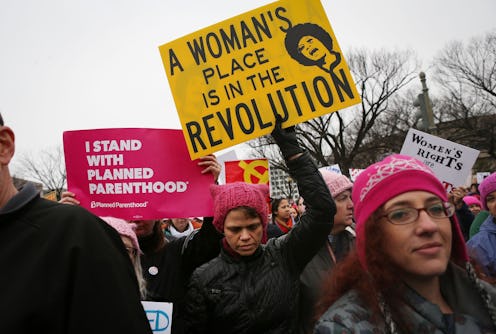Life
A New Poll Revealed How Many People Think Gender Equality Has “Gone Too Far”

In order to solve a cultural problem, we must first be in agreement there is a problem at all. When it comes to deeply-rooted societal issues, like sexism, there is still disagreement about how significant or pressing those problems are. Recently, Pew Research Center released a new study about Americans’ views on gender equality, looking at who believes there is still work to do when it comes to fixing inequality among men and women. (This study didn’t specifically call out people who are transgender or genderqueer, but statistics show there is significant work to be done when it comes to inclusivity and equality for people of every gender.)
While 50 percent of all adults say the U.S. “hasn’t gone far enough” when it comes to giving women equal rights as men, those beliefs shift significantly among partisan, age, and gender lines. Democrats are more likely than Republicans, millennials are more likely than older generations, and women are more likely than men to say we need to be doing more to address gender inequality in the U.S.
Among the most disheartening statistics is 10 percent of all Americans believe gender equality has “gone too far.” That number increases to 13 percent among men, specifically. A whopping 18 percent of Republicans agree that we’ve “gone too far” when it comes to giving women equal rights. Meaning, more than one in six Republicans think the overwhelming evidence of systemic sexism that continues to persist at home, at work, in the media and the world at large isn’t proof that there is work to do; it’s somehow evidence of...too much work that's been done?
Pew also asked people whether they think men have it easier than women today. Again, answers varied widely across gender, age, and partisan lines. Overall, a majority of Americans (58 percent) think neither men nor women have it easier in today’s culture. Among almost every demographic surveyed (i.e. men versus women, Republican versus Democrat), a majority of people in each group agreed that there is “no difference” in the ease of men’s or women’s lives.
There was only one demographic in which a majority believe that men have it easier than women today: young women. Fifty-two percent of millennial women say “men have it easier in our country these days.” This is significantly higher than Gen X, Boomer, and Silent Generation women.
Workplace inequality is one of the issues most linked to overall gender inequality. Among those who say men have it easier, the wage gap is cited as the number one factor. Forty-three percent attribute “better pay” to one of the ways men have it easier in the U.S. today. Twenty-nine percent cite “greater employment opportunities or preferential treatment” as another factor.
These differences in opinion on gender inequality mirror the ways Americans view white privilege. Another recent survey from Pew Research Center found that ideas on whether white people benefit from any societal privileges vary widely among party and racial lines. Black people are significantly more likely than white people, Democrats are significantly more likely than Republicans to say there is societal advantage to being white.
Like with racial inequality, the people who believe gender inequality persists should be telling. It should be telling that in this recent survey women were more likely than men to say that gender-based discrimination is a problem that requires more attention. It should be telling that more women saw ways in which male privilege benefits all men in the U.S.
Despite these differences, it should also be encouraging that young women are among those who see work to be done. If they are any indication (and if everyone helps them do that work), the future is in good hands.